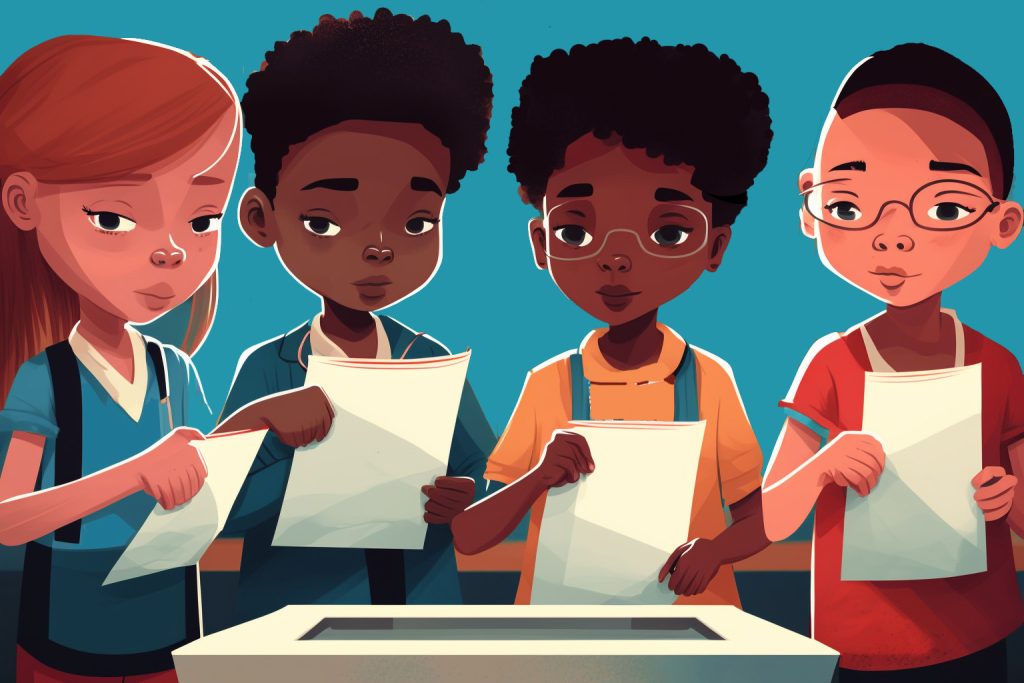Participatory budgets (PBs) are in use in countless communities around the world, giving residents the chance to decide how to allocate parts of the public budget. They are usually open for the entire community to take part – but there can be real advantages to starting with a smaller-scale school participatory budget.
Not only do they empower pupils to get involved in local government; but they can also play a crucial role in the students’ civic education. Unlike other educational tools like mock elections, the children actually get to see how the work they put in leads to concrete results. They demonstrate the power of political engagement to children at an early age, leaving them well-placed to become active, engaged citizens in later life.
Practising Participatory Skills in School
The basic setup of a school PB should allow children to get a grasp of a whole range of what we call participatory skills – including project development, public speaking, voting, running a campaign, and engaging in deliberative democratic discussions. Younger children can start out just voting for their favourite projects – but as they get older, they can begin to get more involved in the entire process, gradually building their confidence, project management skills, and their understanding of how participation works.
Participatory budgeting improves the children’s participatory skills. We have learned from our experience in Czech and Slovak schools that every year, more children feel comfortable enough to propose a project and run a campaign. They realise that there are techniques and methods to the process that they can easily learn and use, making the whole process less intimidating. They realise that debating and taking initiative doesn’t hurt, but rather leads to real results.
The fact that they are given actual money to spend provides them with a real sense of empowerment and makes them feel that they are being taken seriously. The amount of money that gets spent really doesn’t matter – it can be a matter of a couple of thousand euros or sometimes as little as 500 euros. What matters is that they are listened to and that their input leads to actual, concrete change.
The Multiplier Effect of School PBs
Let’s say you are the mayor of a town of 20,000 people. You want to do something innovative and start a participative process – but the residents don’t understand the idea behind it, and the uptake is low. A school PB can be the perfect way to reverse this trend.
Younger children in particular often tell their parents about their day at school. When they get involved in PBs, they come home every day excited to talk about their new school project, and the difference they were able to make. The parents may not know what participatory budgeting is, but the children’s excitement is infectious. And it’s not limited to parents – once you take into consideration the grandparents, aunts and uncles, the result can be far more effective than an article in a local newspaper.
If you really get the kids excited about the project, they will go home on cloud nine, and excitedly recount the whole process. Once parents and other relatives have heard about the process second-hand, they will be less sceptical about similar projects in the community, and more likely to get involved themselves.
Engaging with Civic Technologies
PBs allow children to come into contact with civic technologies early in life. Sometimes they get hands-on experience even before their parents do.
Digital tools are crucial for participatory budgeting because they simplify the process. With a purely analogue approach, teachers would have to print paper ballots for the children and count their votes manually – a time-consuming process that would unnecessarily slow down the voting process.
With the school’s civic technology, pupils can easily open the voting app in the computer room and vote with a few clicks. The children get to experiment with digital tools and learn more about how to use them in different contexts. This is not only faster but also teaches them a high level of digital literacy skills that will be useful to them later in their lives.
School Participatory Budgets Provide a Positive Experience with Democracy
All of this makes school PBs the perfect first step for a community looking to increase citizen participation. Not only are later community-wide projects more likely to succeed thanks to the infectious enthusiasm of the children. Most importantly, the children come away with an understanding of participative democratic processes more profound than they will ever get from a textbook. They make a positive experience with democracy, which means they start building not only skills but trust in democratic processes. As a consequence, they are better equipped and motivated to get involved in local politics throughout their adult lives.
P.S.: School Participatory Budgets are fun! Kids who are usually not fully present get a chance to connect with the community.
This article was produced in cooperation with Participation Factory. Participation Factory is a social enterprise that mainstreams participation and data-driven approaches into governance and process design. Our experts support local governments in designing participation-driven processes and systems, building the capacities of their teams, and implementing digital participation tools and Civic Tech. To learn more, refer to our website or contact us at info@participationfactory.com.
